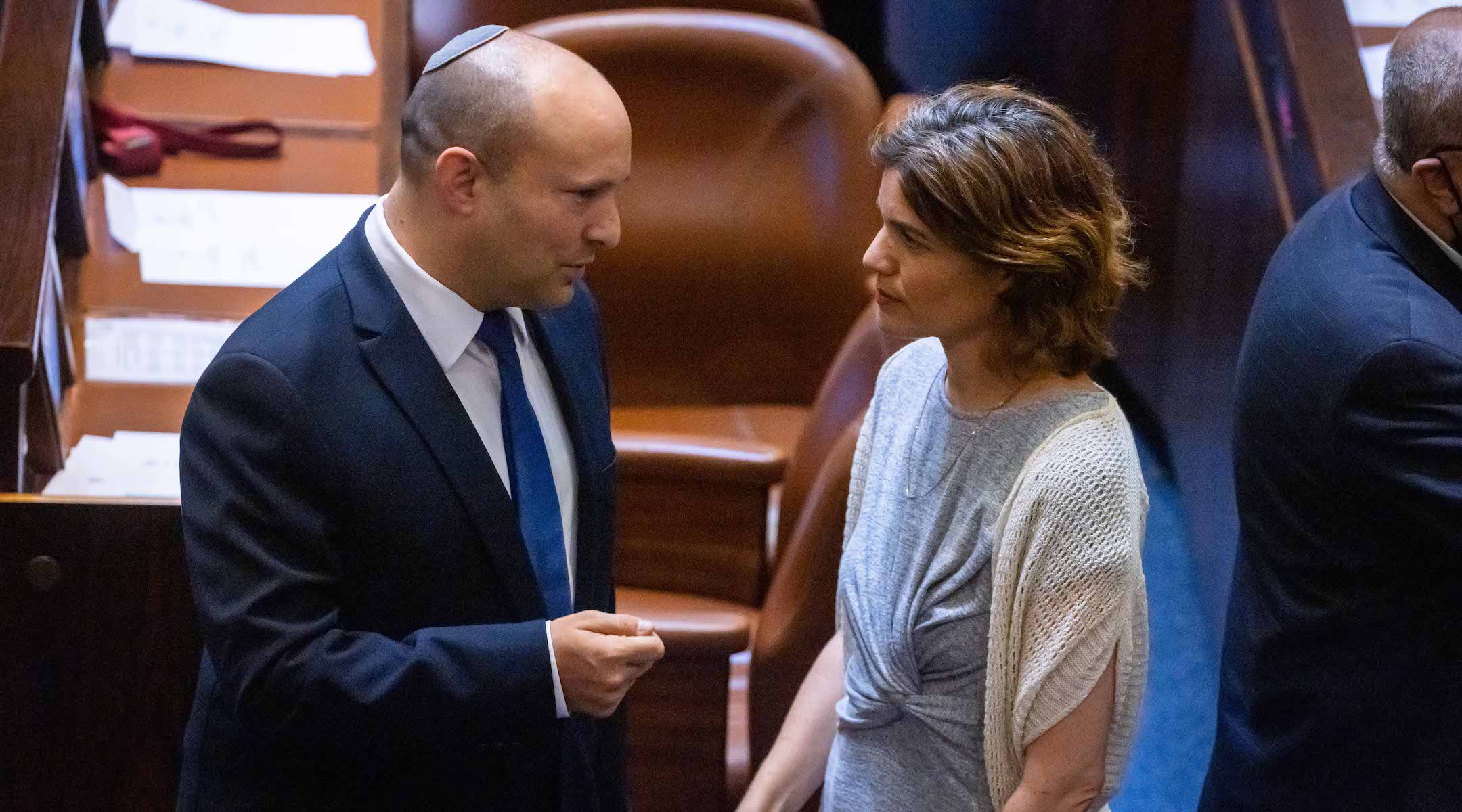(JTA) — In the days before Benjamin Netanyahu’s rival lawmakers announced that they had formed a government to replace the longtime prime minister, one fled her home with her partner and baby after receiving what she called “severe threats” against their safety.
The threats to Tamar Zandberg of the left-wing Meretz party included a fake notice of her death that circulated on social media.
Zandberg wasn’t the only Netanyahu opponent to receive death threats. So did Avigdor Lieberman and Naftali Bennett, former Netanyahu allies who have turned against him. In the face of the threats, leading members of the anti-Netanyahu coalition have received added security.
“Incitement leads to murder,” Labor lawmaker Emilie Moatti, a member of the incoming coalition, tweeted Tuesday. “If it doesn’t stop there will be a murder here, it’s only a matter of time.”
The death threats, as well as heated rhetoric from Netanyahu and his allies, come during a tenuous transition period following the apparent electoral defeat of the right-wing leader. For Americans, it’s a situation that may recall the weeks following the 2020 election and leading up to the storming of the U.S. Capitol by a pro-Trump crowed on Jan. 6. Unlike former President Donald Trump, Netanyahu has not egged on a crowd of violent protesters, and said before the March election that he would respect its results.
But he has said repeatedly this week that the coalition of his opponents poses a danger to Israel. And his Likud party called for a protest in front of a rival’s home.
Israelis, however, are comparing this moment not to Jan. 6 but to the period leading up to the 1995 assassination of Prime Minister Yitzhak Rabin by a right-wing extremist. Rabin’s assassination followed right-wing calls for his murder after he signed a peace accord with the Palestine Liberation Organization led by Yasser Arafat.
“The fact that because of a democratic process, public officials are being threatened, raises the great concern that we haven’t learned our lesson, neither from baseless hatred in Jewish history nor from the Rabin assassination,” Israeli Defense Minister Benny Gantz said in a speech Monday, referring to historical internecine fighting in Jewish societies.
Gantz, who also opposes Netanyahu, added, “Now is the time for every public leader to unequivocally denounce every threat, whatever the democratic decisions may be.”
There has been an echo of the pre-Rabin threats on social media, where a picture of Bennett wearing a kaffiyeh, or traditional Arab headdress, has circulated. A similar poster was famously held up at an anti-Rabin protest in 1995, where Netanyahu spoke, prior to Rabin’s assassination. (Netanyahu has rejected accusations that he played a part in inciting the violent atmosphere preceding the murder.)
One Netanyahu loyalist, Likud lawmaker Miki Zohar, condemned the death threats this week.
“We must state the obvious,” Zohar tweeted Tuesday. “There’s no place for violent discourse and certainly not for threats against public officials and their families on the right or the left, religious or secular.”
Netanyahu does not appear to have issued a similar condemnation. In speeches this week, he has repeatedly accused the new coalition of being a threat to the security and future of Israel.
On Sunday, days before the rival coalition was announced, Netanyahu compared the new government, whose members were all democratically elected, to the world’s most brutal authoritarian regimes.
“A government like that is a danger to the security of Israel and is also a danger to the future of the state,” Netanyahu said.
The new coalition favors a “democracy with the laws of Iran, Syria and North Korea,” he said, because it may pass legislation imposing term limits, which would effectively exclude Netanyahu from again running for prime minister. It could also ban anyone under indictment from serving as prime minister, which also would disqualify Netanyahu, who is on trial for corruption.
Such proposals, Netanyahu charged, are “personal laws against me.”
On Thursday, his Likud party circulated a poster on Twitter calling for a “mass protest” that day outside the private home of Ayelet Shaked, a right-wing politician who recently joined with Netanyahu’s opponents. A far-right lawmaker (and former Shaked ally) also promised to attend the protest.
In a deleted post on Facebook the same day, Netanyahu’s son Yair also called for a protest outside the home of another right-wing, anti-Netanyahu politician.
By Israeli law, a vote installing the new coalition must be held on or before June 14.
JTA has documented Jewish history in real-time for over a century. Keep our journalism strong by joining us in supporting independent, award-winning reporting.






